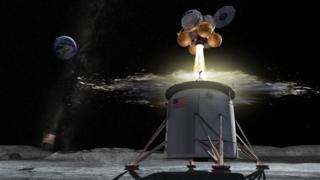Image copyright
NASA
A Nasa facility in Alabama that developed the giant rocket for the Apollo programme in the 1960s will play a key role in sending astronauts down to the Moon’s surface in 2024.
The Marshall Space Flight Center in Huntsville will lead the development of a vehicle that will land astronauts on the body for the first time since 1972.
The decision was announced by Nasa’s administrator Jim Bridenstine.
But it’s a disappointment for Texas, which was in the running.
The White House wants to send a man and a woman to the South Pole of the Moon in five years, under a programme called Artemis.
Huntsville in northern Alabama is known as “Rocket City”, because of its long association with the space programme. It was here that the huge Saturn V launcher, which lofted humans into orbit during the Apollo programme in the 1960s and 70s, was designed, built and tested.
Nasa Moon lander vision takes shape
Image copyright
NASA
Jim Bridenstine said the decision had not been taken lightly
Mr Bridenstine made the announcement at the Marshall facility in front of a test version of the 45m- (149ft-) tall hydrogen tank for the Space Launch System rocket, which will launch the astronauts on their journey from Earth in 2024.
“This was not a decision that was made lightly. A lot of hard work has been done here in Huntsville over well over 10 years now regarding landing systems,” Mr Bridenstine said on Friday.
But not everyone will be happy about the decision. Before the formal announcement, Texas legislators including Senator Ted Cruz had written an open letter to Mr Bridenstine pushing for Nasa’s Johnson Space Center, based in Houston, Texas, to lead the lander development.
Splitting work
Responding to a report that Marshall would be announced as the lead, the lawmakers said: “While the Marshall Space Flight Center specialises in rocketry and spacecraft propulsion, and is undoubtedly the leader in these areas, it is the Johnson Space Center, which has been, and continues to be, ground zero for human space exploration.
“We are deeply concerned that Nasa is not only disregarding this history but that splitting up the work on the lander between two different geographic locations is an unnecessary and a counterproductive departure from the unquestionable success of the previous lunar lander programme.”
Johnson Space Center was in charge of lunar lander development during the Apollo programme.
Responding to the objections, Mr Bridenstine pointed out that of 363 jobs associated with the lander, 140 would be based at Huntsville, while 87 would be at Johnson Space Center.
Image copyright
NASA
How America will return to the Moon
“Johnson Space Center, when it comes to human-machine interface, all the great capabilities that they have throughout time, with the astronaut corps being headquartered there, there’s going to be lots of opportunity for them,” Mr Bridenstine added.
He also said Nasa Johnson would be leading work on the Gateway, a small space station in lunar orbit where astronauts will dock before going down to the lunar surface.
Last month, Nasa called on industry to submit ideas for an initial version of the lander that could take two astronauts down to the Moon in 2024.
Eventually, it wants to build a lander split into three stages that can ferry four people down from Gateway to the lunar surface.
Follow Paul on Twitter.













